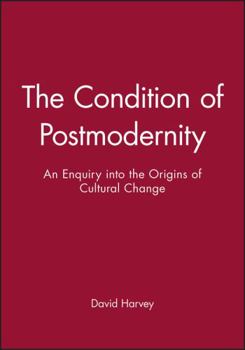The Condition of Postmodernity
Select Format
Select Condition 
Book Overview
In this new book, David Harvey seeks to determine what is meant by the term in its different contexts and to identify how accurate and useful it is as a description of contemporary experience.
Format:Paperback
Language:English
ISBN:0631162941
ISBN13:9780631162940
Release Date:October 1991
Publisher:Wiley-Blackwell
Length:392 Pages
Weight:1.27 lbs.
Dimensions:1.0" x 6.0" x 8.9"
Customer Reviews
5 ratings
Po-Mo Schmomo?
Published by Thriftbooks.com User , 21 years ago
Ask ten academics about what to call our present fin-de-siecle epoch and you'll get ten different labels, but "postmodernism" seems always the default term. Although it's twelve years old, Harvey's book is the best I've read about the pluralistic fabric we daily inhabit. It's edifyingly reader-friendly (especially compared to some of the Franco-drunk rhetoricians out there trying to get a handle on our current world). In precise prose Harvey outlines the shift to our information-as-capital paradigm since the mid-sixties, and the causes of the growth of the temp sector and "just-in-time" production capabilities. Harvey traces the arrival of "flexible accumulation" to the collapse of Fordist production practices in the 1966-73 waves of recession, but covers far more than just economic factors--architecture, art, literature, cinema--without any self-conscious Neo-Marxist whistling-in-the-dark. In his project to articulate a new (meta?)narrative, Harvey's book will probably give post-structuralists a new constellation of ideas to obfuscate with hip terminology and dense prose...Manuel Castell's "The Rise of the Network Society" is another good book along these lines.
Best overview of modern/postmodern condition I have found
Published by Thriftbooks.com User , 22 years ago
This is a great overview of concepts that are, by definition, very fractured. Harvey clarifies and pulls together a number of seemingly disparate elements in a masterful manner. Though this book could work as a good introduction to these concepts, I think readers with some background in the major writers of modernism and postmodernism will get more out of it. Dogmatic postmodernists may be put off that Harvey has the "temerity" to suggest that postmodernism might be an extension of modernism or that he finds some good in modernism and some excesses in postmodern approaches but, they should get over themselves and realize that their insistence that "all meta-narratives are bad" is their own meta-narrative. Overall, Harvey manages to convincingly express his ideas while maintaining a remarkably evenhanded approach. I especially enjoy the fact that he avoids the postmodernist tendency to ignore the complexities of modernism and, thus create a postmodern meta-narrative about the modernist project.
Excellent overview of modernity and post-modernity
Published by Thriftbooks.com User , 23 years ago
David Harvey's "Condition of Post-Modernity" provides excellent representational cases to show the differences between modernity and post-modernity. Although sometimes difficult to follow (I had problems with the chapter pertaining to architecture), Harvey uses enough examples (i.e., economics, art, cinema, etc.) to make sure one understands the differences between post-modernism and modernism. The economic chapter, "Fordism and Flexible Accumulation" is particulary good and shows the gradual transformation from a modernist to a post-modernist economy and society. I was disappointed, however, that Harvey didn't have a complete section focused towards the differences between modernist and post-modernist lit.
The Best Analysis of Postmodernism
Published by Thriftbooks.com User , 23 years ago
I am a graduate student and use this book in a course I teach on postmodernism. I think it is the most convincing analysis of postmodernism available. The book is involved and complex, ranging widely over many areas of culture, but Harvey is a clear writer and a lucid thinker. He defines his terms with precision and the work is relatively free of unnecessary jargon -- a rarity in debates over postmodernism.But be forewarned: Harvey himself is no "postmodernist," and is often (though not always) critical of postmodern culture. The point of Harvey's book is to understand what postmodernism is and why it came about, and to answer these questions he relies heavily on economic and sociological models of social change. In this sense at least, Harvey's methodology is significantly removed from that of the thinkers he discusses.
An excellent survey of culture and how it is shaped.
Published by Thriftbooks.com User , 25 years ago
Recent history, economics, architecture, business, sociology, marxist critique, and urban *design* are presented as a unified, interdisciplinary study of culture and the state of knowledge today. The density of the text is excused by his convincing overview of knowledge and appropriate references to other 19th and 20th century thinkers. Harvey maps our culture and how we think about ourselves and our world from the enlightenment to the 90's. He is careful and backs his arguments very well, which, I imagine, takes incredible discipline considering the mish-mash of post-modernity. If you have some time, are looking for a challenge, and want a comprehensive and convincing crash course on the state of everything, read this book. It is essential for anyone who has studied several social disciplines and wants to understand them collectively. It will certainly affect any thinking person's perception of the late 20th century and the events that led to it.





